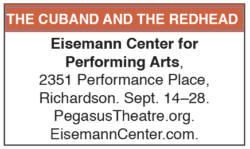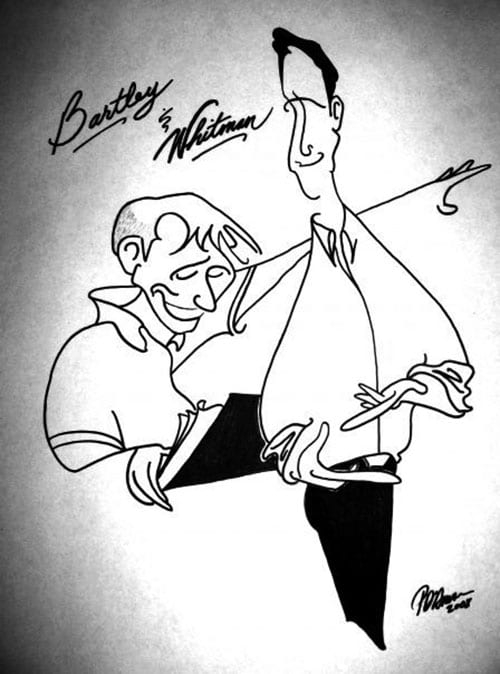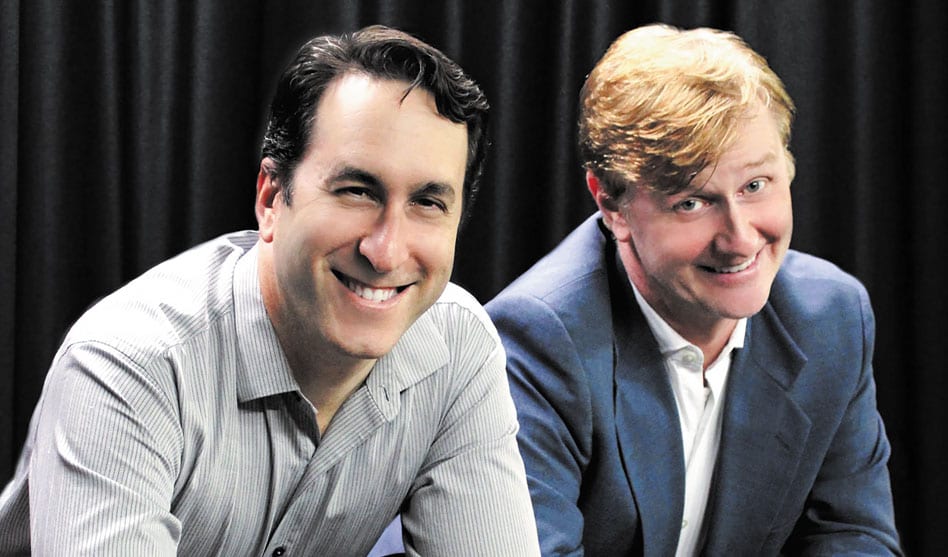With ‘The Cuban and the Redhead,’ partners Robert Bartley and Danny Whitman explore their passion for Desi and Lucy
ARNOLD WAYNE JONES | Executive Editor
jones@dallasvoice.com
Danny Whitman and Robert Bartley have been a couple for nearly 20 years. Five years ago, they started their greatest project together: having a child through surrogacy. It resulted in the 3-year-old son that bounces around during our interview.
Yes, parenting is their greatest project… but not their longest. That superlative belongs to The Cuban and the Redhead, a musical they wrote and composed that has been well more than a decade in the making. And this month, the two men don’t need a surrogate: They are giving birth to it themselves. (Well, with the help of Pegasus Theatre, two dozen actors and a host of craftsmen, designers and technicians.) Whitman and Bartley are producing, directing and choreographing the musical, inspired by the amazing love story (and cultural success) of Lucille Ball and Desi Arnaz. It spans both their lives — Lucy from her days as a B-movie studio actress, Desi from immigrant to bandleader, and going on together for their most enduring achievement, I Love Lucy — the sitcom that basically invented the sitcom.
We spoke with the couple about their process, the subject of the show and what it says to us more than 50 years after the show ended. █
Dallas Voice: How long have you been together? Whitman: It’ll be 20 years in January.
How did you meet? Bartley: I met Danny at the gym. He was working in general management with a friend of mine and we starting talking about [our mutual friend]. Then I asked him out on a brunch date, and it was love at first brunch. It ended up being a five-hour long date. We had our second date that same evening.
How did you move from acting and management into writing and composing? Bartley: Danny had been writing for a long time, since college, and I pulled him over to the dark side of acting. [We toured], but he finally said I don’t wanna be an actor — I wanna write.
So how did this show come about? Whitman: I had been working on a family musical when Bob said, “Let me tell you about this idea I have.” He told me a story from beginning to end [about Lucille Ball and Desi Arnaz] and it was so dramatic and so engaging and so passionate and interesting — just heartbreaking and challenging. Bob knew a lot about Lucy. I started reading all the books about them and reading all sorts of interviews.
 What was your initial interest, Bob? Bartley: Early on, it was because I was obsessed with Lucille Ball — I thought she was just genius. She became queen of the B pictures but couldn’t advance past that. Then [Ball] was offered a DeMille picture, The Greatest Show on Earth, but turned it down to do I Love Lucy. When she was with Desi, she blossomed. She felt safe with him.
What was your initial interest, Bob? Bartley: Early on, it was because I was obsessed with Lucille Ball — I thought she was just genius. She became queen of the B pictures but couldn’t advance past that. Then [Ball] was offered a DeMille picture, The Greatest Show on Earth, but turned it down to do I Love Lucy. When she was with Desi, she blossomed. She felt safe with him.
[The more research I did], the more I realized that Desi is the true hero of our story. I interviewed Edie Adams and Kaye Ballard and others who knew them, and they all immediately gravitated toward Desi. His father was the mayor of Santiago, Cuba and was just elected to congress when the Battista revolution happened [and the family fled to Miami]. He reinvented himself several times over — a true American Dream story that is more valid now with the whole immigration/building walls nonsense.
Ego plays a big part in our story, too. In a way, he let her go first, which was a big step in the Latin community of the time. The bigotry that Desi faced as an early biracial couple [was remarkable]. They didn’t survive as a couple, and the business took them over in a way, but I believe they loved each other till the day they died.
Bob, you’re directing and co-choreographing, but you wrote it together. How do you share your writing duties? Bartley: We’ve been doing this a long time. We’re very connected at the hip. One of us will have an idea for a song, and then the other will flesh it out and share it, or one of us will come up with a tune and adjust it at the piano.
 I’m picturing Buddy Sorrell and Sally Rogers sitting at a piano… or maybe Oscar Levant and Nanette Fabray. Bartley: I’d rather be Nanette Fabray. But basically that’s it — in New York, we have a piano that overlooks the city and we pretend like we’re actual writers.
I’m picturing Buddy Sorrell and Sally Rogers sitting at a piano… or maybe Oscar Levant and Nanette Fabray. Bartley: I’d rather be Nanette Fabray. But basically that’s it — in New York, we have a piano that overlooks the city and we pretend like we’re actual writers.
This is a world premiere, but it has been in development for a long time…. Bartley: The original time we started it, we had done countless days and months of research on the details of their lives. But we still discover new things. This show has been over a decade in development, and I just found out details about Desi’s father and one of the supporting characters.
We developed the show around a couple places, but I grew up in theater here [in North Texas] — I worked at Dallas Summer Musicals and Casa Manana, so I wanted to come home and develop it here. We had a lot of help from [local theaters] with local readings. But this is the first real production.
How has it changed over all these years? Bartley: I reached out to Arthur Laurents, who wrote Gypsy, asking [advice for how to write a biographical musical]. He wrote a very funny email back saying, “The only thing that was true were the names of the theaters. Everything else I made up. You just gotta write the story.” When we freed ourselves of the facts, it enabled us to create a real show. I mean, we still have tons of facts, but chronologically it does not have to maintain the same order. We really learned [in development] that people cared less about the historical aspects than the love story and the relationship challenges.
What’s it like going from workshops to full-on production? Whitman: It adds like 20 layers onto the process that are wonderful and inspiring and complicated. Telling a story that covers this much territory, even from a costuming perspective, presents new challenges. It also helps identify moments. Early in our process it was really hard to make cuts, but we learned early on when you’re willing to let go, the more important moments [stand out].
Bartley: Putting together a show like this is massive — we have 24 in the cast playing multiple roles. We try to keep it moving in the spirit of Evita or Dreamgirls because we cover 20 years. We will ask, “Oh, do we really need this set-piece there? Well, it really is beautiful.”
The Dallas community has been fantastic just jumping in and helping us. Pegasus typically does one-unit-set plays and are very supportive of new writers, but this is a big leap for them.









